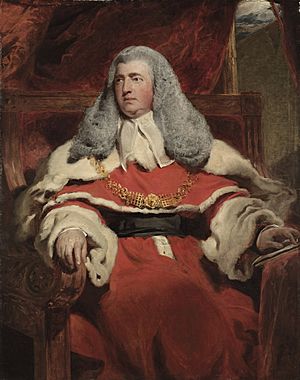Edward Law, 1st Baron Ellenborough facts for kids
Quick facts for kids
The Lord Ellenborough
PC FSA
|
|
|---|---|

Portrait by Thomas Lawrence
|
|
| Lord Chief Justice | |
| In office 11 April 1802 – 2 November 1818 |
|
| Monarch | George III |
| Preceded by | The Lord Kenyon |
| Succeeded by | Charles Abbott |
| Personal details | |
| Born |
Edward Law
16 November 1750 Great Salkeld, Cumberland, England, Great Britain |
| Died | 13 December 1818 (aged 68) London, England, United Kingdom of Great Britain and Ireland |
| Resting place | Charterhouse, London, England |
| Spouse |
Ann Towry
(m. 1789) |
| Children | 10, including Edward, Charles and Henry |
| Parent | Edmund Law (father) |
Edward Law, 1st Baron Ellenborough (born November 16, 1750 – died December 13, 1818), was an important English judge. He worked as a lawyer and a member of parliament. Later, he became the Attorney General, which is the chief legal advisor to the government. Finally, he reached the highest judicial position as the Lord Chief Justice.
Contents
Early Life and Education
Edward Law was born in a place called Great Salkeld in Cumberland, England. His father, Edmund Law, was a church leader who later became the Bishop of Carlisle.
Edward went to school at Charterhouse and then studied at Peterhouse, Cambridge and Trinity College at Cambridge University. He was very good at his studies, especially in math. Even though his father wanted him to become a priest, Edward decided to study law instead. He joined Lincoln's Inn, which is one of the places where lawyers are trained in London.
Career as a Lawyer and Judge
Edward Law became a lawyer in 1780. He quickly became known for his skill and got many important cases.
Defending Warren Hastings
In 1787, he was chosen to be the main lawyer for Warren Hastings. Hastings was a very important person who had governed India for Britain. He was on trial in the House of Lords, which is part of the British Parliament. Edward Law did a great job defending him, and everyone noticed his talent.
Becoming a Government Official
Edward Law started his political career supporting a group called the Whigs. However, after the French Revolution, he changed his mind and supported William Pitt, who was the Prime Minister.
In 1801, he became the Attorney General. This meant he was the chief legal officer for the government. Around the same time, he also became a member of the House of Commons, representing Newtown. He was also given the title of "Sir" (knighted).
Lord Chief Justice
In 1802, Edward Law became the Lord Chief Justice of the King's Bench. This is a very high position in the legal system. When he became Lord Chief Justice, he was also given a special title: Baron Ellenborough. This title came from a village in Cumberland where his family had lived for a long time.
Important Legal Cases
As a judge, Lord Ellenborough handled many important cases.
- In 1803, he was the judge in a case involving Edward Despard. Lord Ellenborough explained that Despard's actions were very serious because they aimed to break up the new union between Great Britain and Ireland.
- Later in 1803, he joined the Privy Council of the United Kingdom, a group of important advisors to the King.
- In 1806, for a short time, he also served as Chancellor of the Exchequer, which is like the head of the country's money department.
- He also accepted a position in the government's cabinet while still being the chief judge. This was unusual and caused some debate at the time.
Lord Ellenborough was known for his deep understanding of the law. His decisions, especially in cases about business law, were highly respected. However, he could be tough on lawyers in court. In some political trials, like the one involving Lord Cochrane in 1814 (which was about financial wrongdoing), some people felt he was unfair to the accused.
In another famous case in 1817, involving William Hone (about freedom of speech in publishing), Lord Ellenborough told the jury to find Hone guilty. But the jury decided Hone was innocent. This decision was very important for freedom of the press.
On the other hand, Lord Ellenborough also made some very fair and kind decisions. For example, in a case called R. v. Inhabitants of Eastbourne, he ruled that French refugees in England who had no money should be given enough support to live. This decision has been praised for protecting human rights.
He also made an important ruling in a case about copyright (the right to copy and share creative works). He said that people should be able to use parts of someone else's work to help science and learning. This idea helped create the rule of "fair use" in copyright law, which allows limited use of copyrighted material without permission.
Lord Ellenborough retired from his job as a judge in November 1818 and passed away shortly after.
Family Life
Lord Ellenborough married Ann Towry in 1789. They had ten children, five sons and five daughters, who lived past infancy.
Some of their notable children include:
- Edward Law, 1st Earl of Ellenborough, who later became the second Baron Ellenborough and then an Earl.
- Charles Ewan Law, who was a lawyer and a member of parliament.
- Henry Spencer Law.
Lord Ellenborough also had three brothers who became famous:
- John Law, who was a bishop.
- Thomas Law, who moved to the United States and married a granddaughter of Martha Washington.
- George Henry Law, who was also a bishop.
The Law family continued to have many members involved in the Church of England for generations.
 | Anna J. Cooper |
 | Mary McLeod Bethune |
 | Lillie Mae Bradford |

